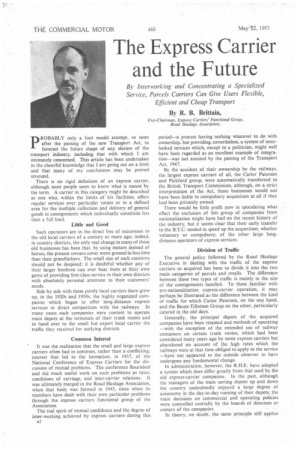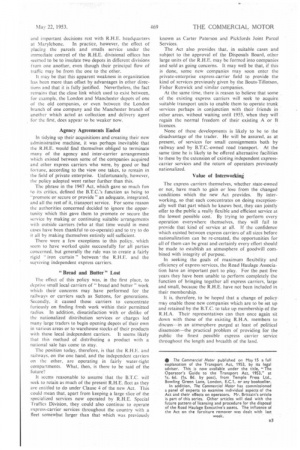The Express Carrier and the Future
Page 36

Page 37

If you've noticed an error in this article please click here to report it so we can fix it.
By Interworking and Concentrating a Specialized Service, Parcels Carriers Can Give Users Flexible, Efficient and Cheap Transport By R. B. Brittain,
Vice-Chairman, Express Carriers' Functional Group, Road Haulage Association.
pROBABLY only a fool would attempt, so soon after the passing of the new Transport Act, to forecast the future shape of any section of the transport industry, including that with which I am intimately concerned. This article has been undertaken in the cheerful knowledge that I am going out on a limb and that many of my conclusions may be proved unsound.
There is no rigid definition of an express carrier, although most people seem to know what is meant by the term. A carrier in this category might be described as one who, within the limits of his facilities, offers regular services over particular routes or in a defined area for the multiple collection and delivery, of general goods in consignments which individually constitute less than a full load.
Little and Good Such operators are in the direct line of succession to the old local carriers of a century or more ago; indeed, in country districts, the only real change in many of these old businesses has been that, by using motors instead of horses, the present owners cover more ground in less time than their grandfathers. The small size of such concerns should not be despised; it is doubtful 'whether any of their larger brethren can ever beat them at their own game of providing first-class service in their own districts with absolutely personal attention to their customers' needs.
Side by side with these purely local carriers there grew up, in the 1920s and 1930s, the highly organized companies which began to offer long-distance express services in direct competition with the railways. In many cases such companies were content to operate main depots at the terminals of their trunk routes and to hand over to the small but expert local carrier the traffic they received for outlying districts.
Common Interest
It was the realization that the small and large express carriers often had in common, rather than a conflicting, interest that led to the formation, in 1937, of the National Conference of Express Carriers for the discussion of mutual problems. The conference flourished and did much useful work on such problems as rates, conditions of carriage, and inter-carrier relations. It was ultimately merged in the Road Haulage Association, when that body was formed in 1945, since when its members have dealt with their own particular problems through the express carriers functional group of the Association.
The real spirit of mutual confidence and the degree of inter-working achieved by express carriersduring this 1;2 period—a process having nothing whatever to do with ownership, but providing, nevertheless, a system of interlocked services which, except to a politician, might well have been regarded as an excellent example of integration—was not assisted by the passing of the Transport Act, 1947.
By the accident of their ownership by the railways, the largest express carriers of all, the Carter Paterson and Pickford group, were automatically transferred to the British Transport Commission, although, on a strict interpretation of the Act, those businesses would not have been liable to compulsory acquisition at all if they had been privately owned.
There would be little profit now in speculating what effect the exclusion of this group of companies from nationalization might have had on the recent history of the industry, but it seems clear that their early transfer to the B.T.C. tended to speed up the acquisition, whether voluntary or compulsory, of the other large -longdistance operators of express services.
Division of Traffic
The general policy followed by the Road Haulage Executive in dealing with the traffic of the express carriers so acquired has been to divide it into the two main categories of parcels and smalls. The difference between these two types of traffic is mainly in the size of the consignments handled. To those familiar with pre-nationalization express-carrier operation, it may perhaps be illustrated as the difference between the kind of traffic for which Carter Paterson, on the one hand, and the Bouts-Tillotson Group on the other, particularly catered in the old days.
Generally, the principal depots of the acquired companies have been retained and methods of operating — with the exception of the extended use of railway containers on certain trunk routes, which had been considered many years ago by some express carriers but abandoned on account of the high rates which the railways were at that time obliged to apply to the service — have not appeared to the outside observer to have undergone any fundamental change.
In administration, however, the R.H.E. have adopted a system which does differ greatly from that used by the old express-carrier companies. In the past, although the managers of the main sorting depots up and down the country undoubtedly enjoyed a large degree of autonomy in the day-to-day running of their depots, the main decisions on commercial and operating policies were controlled centrally by the boards of directors or owners of the companies.
In theory, no doubt, the same principle stilt applies and important decisions rest with R.H.E. headquarters at Marylebone. In practice, however, the effect of placing the parcels and smalls service under the immediate control of the R.H.E. divisional offices has seemed to be to insulate two depots in different divisions from one another, even though their principal flow of traffic may be from the one to the other.
It may be that this apparent weakness in organization has been more than offset by advantages in other directions and that it is fully justified. Nevertheless, the fact remains that the close link which used to exist between, for example, the London and Manchester depots of one of the old companies, or even between the London branch of one company and the Manchester branch of another which acted as collection and delivery agent for the first, does appear to be weaker now.
Agency Agreements Ended In tidying up their acquisitions and creating their new administrative machine, it was perhaps inevitable that the R.H.E. would find themselves obliged to terminate many of the agency and inter-carrier arrangements which existed between some of the companies acquired and other express carriers who were, by good or bad fortune, according to the view one takes, to remain in the field of private enterprise. Unfortunately, however, the policy adopted went rather further than this.
The phrase in the 1947 Act, which gave so much fun to its critics, defined the B.T.C.'s function as being to "promote or secure or provide" an adequate, integrated, and all the rest of it, transport service. For some reason the authorities concerned decided to ignore the opportunity which this gave them to promote or secure the service by making or continuing suitable arrangements with outside carriers (who at that time would in most cases have been thankful to co-operate) and to try to do it all by making themselves entirely self-sufficient.
There were a few exceptions to this policy, which seem to have worked quite successfully for all parties concerned, but generally the rule was to create a fairly rigid " iron curtain" between the R.H.E. and the surviving independent express carriers.
"Bread and Butter" Lost 'rite effect of this policy was, in the first place, to deprive small local carriers of "bread and butter " work which their concerns may have performed for the railways or carriers such as Suttons, for generations. Secondly, it caused those carriers to concentrate Furiously on finding fresh work within their permitted radius. In addition, dissatisfaction with or dislike of the nationalized distribution services or charges led many large traders to begin opening depots of their own in various areas or to warehouse stocks of their products with these local independent carriers, It seems likely that this method of distributing a product with a national sale has come to stay_ The position today, therefore, is that the R.H.E. and railways, on the one hand, and the independent carriers on the other, are operating in fairly water-tight compartments. What, then, is there to be said of the future?
It seems reasonable to assume that the B.T.C. will seek to retain as much of the present R.H.E. fleet as they are entitled to do under Clause 4 of the new Act. This could mean that, apart from keeping a large slice of the specialized services now operated by R.H.E. Special Traffics Division, they could also continue to operate express-carrier services throughout the country with a fleet somewhat larger than that which was previously
known as Carter Paterson and Pickfords Joint Parcel Services.
The Act also provides that, in suitable cases and subject to the approval Of the Disposals Board, other large units of the R.H.E. may be formed into companies and sold as going concerns. It may well be that, if this is done, some new companies may soon enter the private-enterprise express-carrier field to provide the kind of services previously given by the Bouts-Tillotson, Fisher Renwick and similar companies.
At the same time, there is reason to believe that some of the existing express carriers will seek to acquire suitable transport units to enable them to operate trunk services perhaps in conjunction with their friends in other areas, without waiting until 1955, when they will regain the normal freedom of their existing A or B icences.
None of these developments is likely to be to the disadvantage of the trader. He will be assured, as at present, of services for small consignments both by railway and by B.T.C.-owned road transport. At the same time he is likely to be offered alternative facilities to these by the extension of existing independent expresscarrier services and the return of operators previously nationalized.
Value of interworking The express carriers themselves, whether state-owned or not, have much to gain or lose from the changed conditions which the new Act provides. By interworking. so that each concentrates on doing exceptionally well that part which he knows best, they can jointly offer to the public a really flexible and efficient service at the lowest possible cost. By trying to perform every operation everywhere themselves, they will fail to provide that kind of service at ail. If the confidence which existed between express carriers of all sizes before nationalization can be re-created, the opportunities for all of them can be great and certainly every effort should be made to establish an atmosphere of goodwill combined with integrity Of purpose.
In seeking the goals of maximum flexibility and efficiency of express services, the Road Haulage Association have an important part to play. For the past five years they have been unable to perform completely the function of bringing together all express carriers, large and small, because the R.H.E. have not been included in their membership.
It is, therefore, to be hoped that a change of policy may enable those new companies which are to be set up and retained by the B.T.C. to take up membership of the R.H.A. Their representatives can then once again sit down with those of the existing R.H.A. members to discuss—in an atmosphere purged at least of political dissension—the practical problem of providing for the public the finest possible express carrier service throughout the length and breadth of the land.




















































































